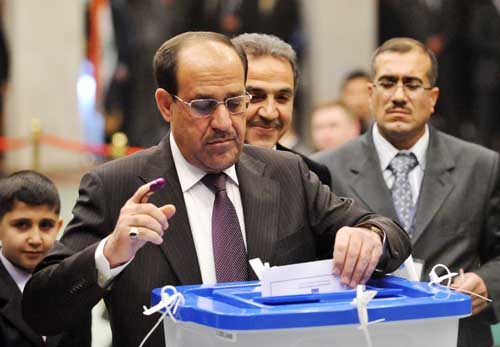Will pivotal election bring peace to Iraq?
Iraq held its second parliamentary election on Sunday amid multiple mortar attacks and bombings, a sign that the country still faces various difficulties to realize peace and progress in reconstruction.
 |
|
Iraqi Prime Minister Nuri al-Maliki casts his ballot at a polling station in Baghdad, capital of Iraq, on March 7, 2010. Iraq began its official voting for the country's crucial parliamentary election in the early morning on Sunday. This is the second national poll since the fall of Saddam Hussein's regime from U.S.-led invasion in 2003. [Zhang Ning/Xinhua] |
Since the fall of Saddam Hussein's regime, Iraq has seen humble progress in reconstruction, improvement of basic services while fierce political struggle and unstable security situation remain.
The general election will shape the political arena and is a test of the war-torn country's national reconciliation and democratic process.
Since Prime Minister Nuri al-Maliki took office in May 2006, Iraqis have experienced a surge of sectarian violence in 2006 and 2007, which left tens of thousands dead, then a serious political crisis with a boycott against the government among certain politicians, and a resurge of violence since the end of last June.
A new 325-seat parliament will be elected and a new government will be formed. Iraq is at an important historical point as to whether it will march toward peace and development, or return to violence as before.
For most Iraqi people, they say they have become tired of sectarian violence and are eager for a normal life with improved basic services.
Different from the 2005 parliamentary election, most of the major political coalitions contesting this year's election are cross-sectarian. Shiite-led blocs also include Sunni candidates, and vice versa. They promote nationalism and goals of serving all Iraqi people. This is a good signal at least on the surface.
However, an acceleration of post-war reconstruction still relies on the solution to a lot of major issues confronting different parties.
During the past four years, Maliki's efforts to national reconciliation have encountered serious setbacks due to the disputes over local militia, oil law and other issues. A substantial consensus among different blocs is the key to peace.
From the electoral law to the candidate ban, the preparations for this year's election have witnessed fierce struggle between blocs.
No boycott among voters occurs, despite a temporary withdrawal of the National Dialogue Front led by banned candidate Saleh al- Mutlaq. However, the ban on some Sunni politician from running in the election is still likely to increase uncertainties after the election.
Whether the main parties accept the poll results as credible or representative is important, as some parties boycotted the results in the last election over alleged frauds.
As planned, the U.S. troops in Iraq will be cut by half by the end of August and fully withdraw at the end of next year. It is questionable whether the Iraqi security forces are fully capable of shouldering heavy responsibilities in ensuring security for ordinary Iraqis.
Since the U.S. troops' withdrawal from Iraqi towns last June, the capital Baghdad had been hit by strings of car bombs, worsening the security situation. Terrorist groups and loyalists to the outlawed Baath party still threaten the country's peace efforts.
Up to 24 people were killed and dozens wounded in waves of mortar barrages and bomb explosions in Baghdad on Sunday, as Iraqis voting in the country's parliamentary election, which shows that insurgents remain active. Iraq still has a lot to do before peace is really stored.
 0
0 






